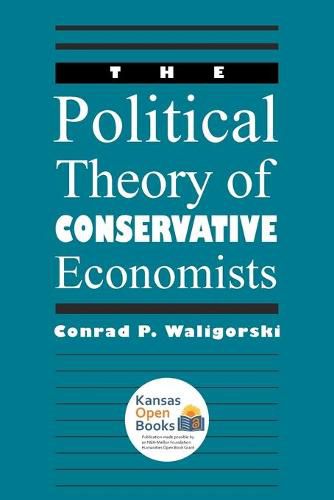Readings Newsletter
Become a Readings Member to make your shopping experience even easier.
Sign in or sign up for free!
You’re not far away from qualifying for FREE standard shipping within Australia
You’ve qualified for FREE standard shipping within Australia
The cart is loading…






It’s difficult to overstate the impact of conservative economics on American life. The conservative thought of economists like Milton Friedman, James Buchanan, and Friedrick Hayek has provided the conceptual framework that undergirds nearly every aspect of current U.S. social-economic policy. Although a great deal has been written about the economic theories of these Nobel Prize-winning economists, this study is the first to examine the political theory that underlies conservative economics and its implications for public policy.
Long associated with the Chicago and public choice schools of thought, Friedman, Buchanan, Hayek, and others have consistently repudiated Keynesian principles. They have steadfastly opposed social welfare policies and regulation of private enterprise, championing instead the free market as a mechanism for ordering society.
In this book Conrad Waligorski analyzes the political content of the conservative economists’ arguments. In so doing, he illuminates the political, economic, and philosophical ideas behind and justification for the laissez-faire policy-the reduced regulation, intervention, and welfare favored by conservative governments in the United States, Canada, and Britain.
$9.00 standard shipping within Australia
FREE standard shipping within Australia for orders over $100.00
Express & International shipping calculated at checkout
It’s difficult to overstate the impact of conservative economics on American life. The conservative thought of economists like Milton Friedman, James Buchanan, and Friedrick Hayek has provided the conceptual framework that undergirds nearly every aspect of current U.S. social-economic policy. Although a great deal has been written about the economic theories of these Nobel Prize-winning economists, this study is the first to examine the political theory that underlies conservative economics and its implications for public policy.
Long associated with the Chicago and public choice schools of thought, Friedman, Buchanan, Hayek, and others have consistently repudiated Keynesian principles. They have steadfastly opposed social welfare policies and regulation of private enterprise, championing instead the free market as a mechanism for ordering society.
In this book Conrad Waligorski analyzes the political content of the conservative economists’ arguments. In so doing, he illuminates the political, economic, and philosophical ideas behind and justification for the laissez-faire policy-the reduced regulation, intervention, and welfare favored by conservative governments in the United States, Canada, and Britain.